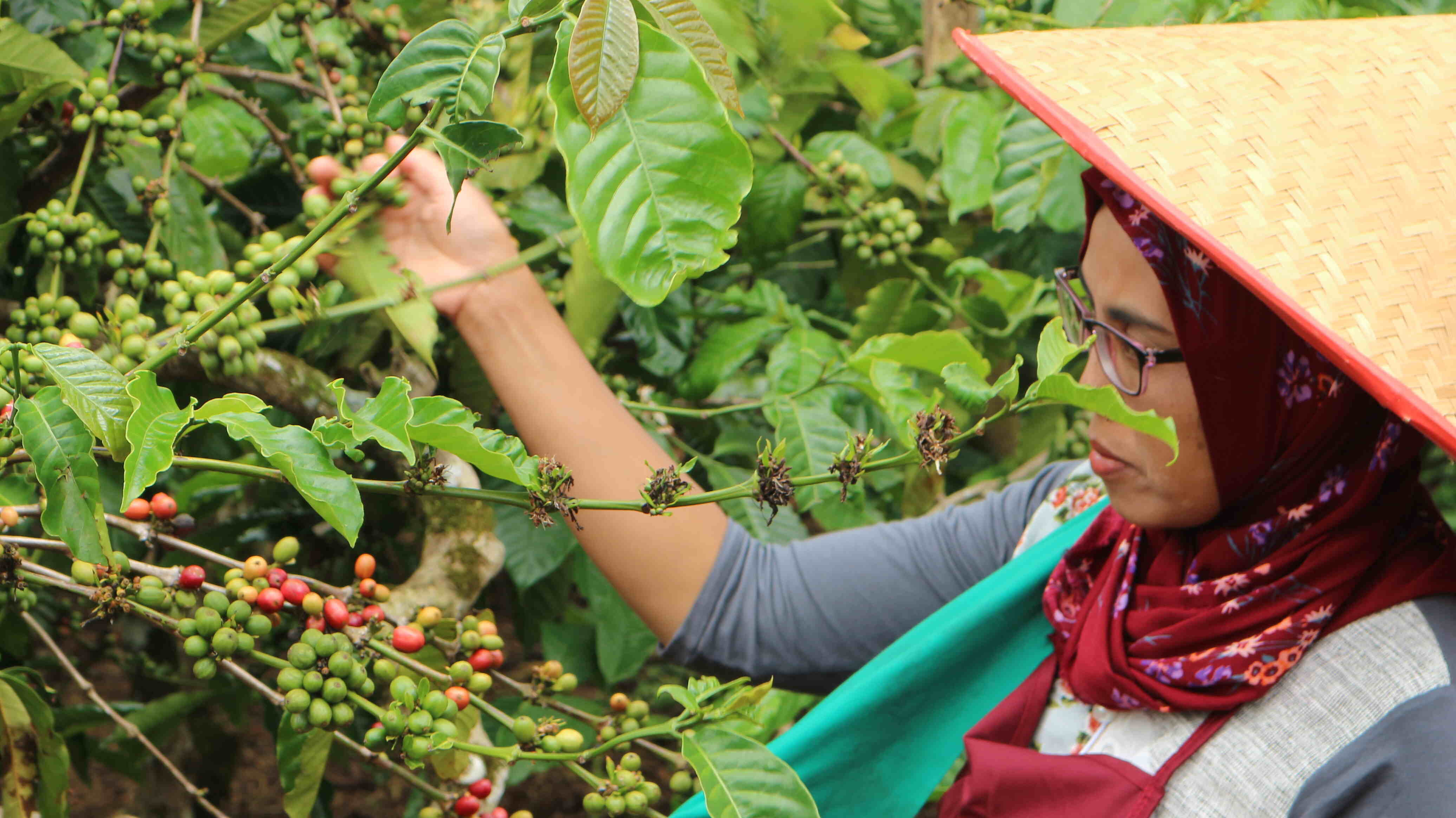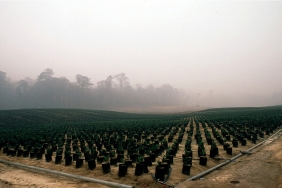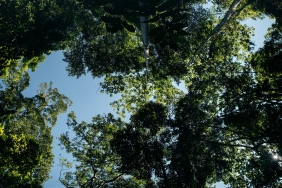WOMEN NURSES OF NATURE
Mist still covered Ngarip village that morning, when dozens of women gathered in a small room belonging to the Srikandi Cooperative while listening to stories from Sri Wahyuni. The head of the Srikandi Cooperative shared her experience with other women in her village in building the Srikandi Business Saving group, which is now a cooperative with the name Maju Bersama Producer Cooperative. The group was initially formed in 2015 after a training conducted by WWF Indonesia together with Rumah Kolaborasi, a collaboration of environmental NGOs in Lampung.
"Of the 31 people who participated in the training, only 18 people had the commitment to form a Business Saving Group (KSU) and finally successfully formed in August 2015. Because we wanted to invite other women to join the group, we agreed that the 18 members were required to invite others so that there were 39 people including choosing 5 people as KSU administrators. That way, by November 2015, there were 60 members. After that, it was agreed that the business unit to be established was coffee powder. The reason was simple. Because this area is one of Lampung's coffee centers. Most of the people in Ngarip village are coffee farmers, but so far we have always bought coffee powder from outside. In this savings and loan activity, our job is to change people's behavior. Changing their habits so that they do not go into debt to middlemen during the famine and learn to save money during the harvest. The concept of KSU Srikandi is to improve the community's economy so that they no longer destroy the forest." Sri Wahyuni said excitedly.
The group she formed with other women in her village developed quite quickly. In just one year, KSU members had become 120 people and were able to distribute 33 million in profit to members. At the end of 2017, the members increased to 160 people and the SHU distributed increased to 58 million. Until the end of 2018, KSU members who joined have amounted to 200 people and SHU distributed to members has reached 100 million. This is a success story of the women in Ngarip village in encouraging rural community-based economic development. The micro-finance model practiced by Srikandi Cooperative has provided many benefits for the villagers in meeting their daily needs and as business capital through savings. Thanks to the Srikandi coffee powder unit business they pioneered, every year sales increase, although marketing is limited to the Ulubelu area and as souvenirs for visiting guests. In addition, many of the cooperative members have implemented sustainable farming patterns after receiving sustainable agriculture field school training from WWF Indonesia. Coffee farmers who apply sustainable cultivation, including women in the village, have gained important ecological knowledge in managing their resources.
As one of the most important tropical rainforests in Sumatra, TNBBS is blessed with an abundant diversity of flora and fauna and has an attachment to the community in all aspects of life. Unfortunately, land use change is a major problem as it transforms the formerly forested landscape into plantations for export commodities, especially coffee. These changes have consequences that threaten the biodiversity present there that will have long-term consequences for humans.
To address these issues, a gender mainstreaming strategy is needed. Gender mainstreaming is an effort to pay attention to gender in various sectors and aspects of life so as to reduce the gap in the role and participation of women and men.
As an inseparable part of nature, the role of women is very important in caring for, preserving, and managing available resources. Thus, efforts to save priority habitats in Bukit Barisan Selatan National Park can only succeed if women play a major role in resource management and are involved in decision making. Unfortunately, this has not yet colored many community dynamics in the buffer villages of BBSNP. For this reason, the involvement of women is one thing that needs to be emphasized in the implementation of the program to save priority habitats in TNBBS. This program focuses on an area called the Intensive Protection Zone (IPZ), an area of 100,000 hectares which is the concentration area of 3 key animals in TNBBS, especially the Sumatran Rhino.
Through assistance to 10 priority villages in the Intensive Protection Zone (IPZ) area, WWF sees the importance of forming women's groups to develop economic potential in the village. Since 2018, as part of the effort to encourage a greater role of women in the IPZ buffer villages, women's Business Saving Groups (KSU) have been formed in 3 villages, including KSU Teratai Indah Desa Pakunegara, KSU Melati Sumber Barokah Desa Sukamarga, and KSU Mulyo Lestari Desa Margomulyo. To increase the capacity and motivation of KSU administrators, they organized a comparative study to the Srikandi Maju Bersama Producer Cooperative.
This comparative study activity aims to exchange information and share experiences from Srikandi which has been considered quite successful in developing KSU in Ngarip, Tanggamus. Discussions were held related to strategies for building business groups, strengthening institutions, conducting good bookkeeping and rules of the game in KSU, building a spirit of self-reliance with mutual trust, and building independent community businesses. It is realized that community empowerment efforts in villages bordering forests are not optimal because they are not supported by strong institutions and community capacity. The community is considered unable to identify and manage their potential resources to be more productive because they are influenced by factors such as lack of knowledge and skills, weak mastery of appropriate technology, unestablished organizational systems, difficulties in obtaining working capital, and inadequate access to marketing.
Therefore, this comparative study can be one of the efforts to increase the capacity of women's groups in the buffer zone villages of the National Park in economic development in their villages. The comparative study participants consisted of KSU Teratai Indah Pakunegara with 6 women and 1 man from the Village Government, KSU Melati Sumber Barokah Sukamarga with 5 women, KSU Mulyo Lestari Margomulyo: 6 women, KSU Srikandi 2 people. Facilitators who attended included Heri Hermianto and Konaji.
These three villages that are directly adjacent to TNBBS have their own economic potential. Margomulyo, for example. The village, which is located quite remote and directly adjacent to TNBBS, has great potential with the availability of nutmeg, pepper, bananas, coconuts, coffee that have been cultivated by the community. While Pakunegara, the majority of people grow rice paddies. Sukamarga, located in Suoh Resort, produces a lot of coffee and chocolate. This potential if managed effectively and paying attention to environmental principles will certainly provide added value to the community so that pressure on the TNBBS area can be reduced.
One of the efforts to develop the economic potential of the village is through KSU which acts not only as a micro-scale capital provider institution, but also can develop business units from the potential available in the village.
In this meeting, each group shared their challenges in pioneering KSU in the village. Being relatively new, KSUs in the three villages still face many challenges, both due to the lack of members, small loans, and the absence of business units. They also developed an action plan for future KSU activities. Each village was invited to assess the potential of their natural resources to be used as a source of business with several indicators such as availability of raw materials, skills possessed, level of competition, market availability, and business capital. KSU Mulyo Lestari from Margomulyo Village included ground coffee, nutmeg/atsiri oil, coconut oil, banana chips, and compost/organic fertilizer business as potentials that could be developed into a business unit. From the ranking given, ground coffee, nutmeg/atsiri oil, and compost/organic fertilizer are the commodities that are considered the most potential to be developed. While organic rice, banana chips, coconut oil, and ground coffee are the choices of KSU Teratai Indah Paku Negara to be developed with the main choice of ground coffee.
While KSU Melati Sumber Barokah of Sukamarga Village included cocoa powder, ground coffee, packaged rice, bananas, salak and its processed products (salak coffee and sweets), meatball grinder, instant ginger, palm sugar, and fish breeding as potential superior products of their village by giving the highest points for ground coffee, packaged rice, and bananas. The development of these products will be encouraged in the future through KSU in these TNBBS buffer villages. Realizing the important role of women in village economic development and natural resource management, the participation of many parties is needed to encourage the success of women's institutions in these villages through strengthening KSU.





